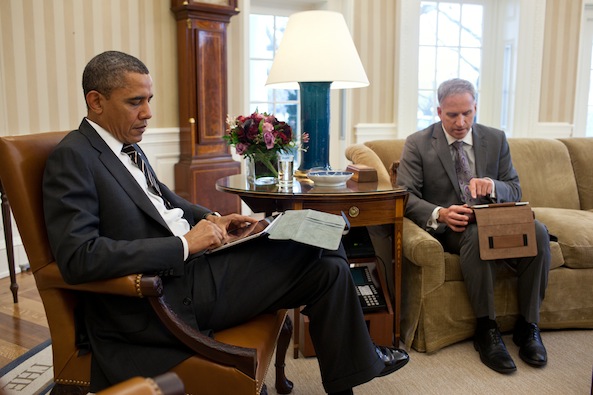In April, the U.S. International Trade Commission (ITC) ordered an import ban on the iPhone 3G/3GS/4 after determining Apple had violated Samsung’s 3G cellular technology patent. Apple was hoping the U.S. Trade Representative (USTR) would overturn ITC’s decision on the basis that Samsung was asserting a standards-essential patent.
Needles to say, Apple asked ITC to stay an order while the court considered the appeal, arguing the sales ban would “sweep away an entire segment of Apple’s product offerings.” And in an interesting twist earlier this week, the nation’s top carrier Verizon Wireless pressured President Obama to intervene in the Apple v. Samsung case and veto the impending ban…
The Big Red telco dispatched its general counsel Randal S. Milch who took to The Wall Street Journal, penning an editorial asking the Obama administration to prevent the iPhone ban.
If the administration signaled that it would veto ITC relief orders in instances where courts would have found such orders inequitable, it could discourage parties from clogging the ITC’s docket with such cases in the first place.
Then the White House could, mercifully, find it unnecessary to veto ITC decisions, perhaps for another 25 years.
Verizon may be facing an uphill battle because no U.S. president to this date has vetoed an ITC decision since 1987. Besides, a whopping 250,000 patents are relevant to today’s smartphones.
Now, I know what you must be thinking, but Verizon isn’t taking sides here because the sales ban only affects the AT&T versions of the iPhone 3G/3GS/4.
So why exactly is Verizon opposing the ban?
Out of fear the ruling would set a dangerous precedent.
High-tech products can implicate thousands of patents. If the ITC finds that a product infringes even a single one, it can stop the product at the border. But that’s basically it.
The commission can’t levy much in the way of a lesser penalty. In the end the consumer suffers when the use of such an enforcement tool is unwarranted.
The carrier’s logic is simple: should handset vendors be allowed to inundate the ITC with such complaints, import bans – if enforced – would affect sales of popular handsets on its network, in turn leading to decreased service revenues that might hurt its fortunes.
By handing down these sales ban orders, the ITC encourages patent abuse, Milch wrote:
What we have warned is that patent litigation at the ITC – where the only remedy is to keep products from the American public – is too high-stakes a game for patent disputes.
The fact that the ITC’s intellectual-property-dispute docket has nearly quadrupled over 15 years only raises the stakes further. Smartphone patent litigation accounts for a substantial share of that increase.
From Verizon’s perspective, presidential intervention is only needed when the patent holder isn’t practicing the technology itself (patent trolls), has already agreed to license the patent on reasonable terms or when the infringing piece of the product “isn’t that important to the overall product, and doesn’t drive consumer demand for the product at issue”.
The infringed Samsung invention is the U.S. Patent No. 7,706,384 entitled ‘Apparatus and method for encoding/decoding transport format combination indicator in CDMA mobile communication system.’
The order goes into effect by August 5, unless the administration intervenes.

